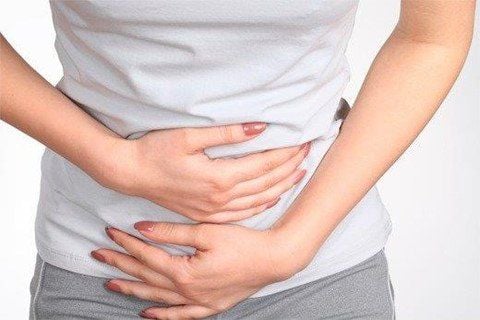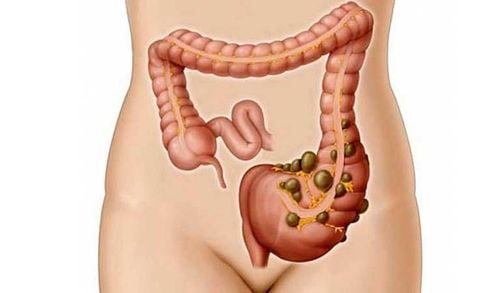This is an automatically translated article.
Posted by Specialist Doctor I Le Nguyen Hong Tram - Gastroenterologist - Department of Examination & Internal Medicine - Vinmec Nha Trang International General HospitalConstipation is a common digestive disease caused by many different causes. Finding the cause of the disease will help the doctor come up with an effective treatment and prevention plan for constipation, avoiding affecting health as well as quality of life.
1. What is the cause of constipation?
Constipation is defined as fewer than 3 bowel movements per week. According to the Rome Criteria, a more detailed definition of constipation is defined as a patient who has at least 2 of the following symptoms: bowel movements less than 3 times per week, difficulty in defecation, hard stools, sensation of anal obstruction rectum, feeling that the bowels do not go completely, must use hands to support during defecation (some patients have to use their hands to remove stools or press on the abdominal wall during defecation).
There are many causes of constipation, but can be divided into two main groups: Primary constipation and secondary constipation.
1.1. Group of primary causes of constipation
Primary constipation is divided into the following three categories: Normal bowel movements, slow bowel movements, and pelvic floor dysfunction.
Constipation with normal bowel movements is the most common type of primary constipation. Although stool passes through the colon at a normal rate, the patient finds it difficult to pass stool. Slow bowel motility constipation is characterized by reduced colonic motility and occurs more commonly in women. Patients may have mild abdominal distention or palpable stool in the sigmoid colon. Pelvic floor dysfunction: Patients often complain of prolonged defecation, a feeling of incomplete bowel movements, or having to use pressure on the pelvic floor during defecation to allow stool to pass.
1.2. Group of causes of secondary constipation
Causes of secondary constipation due to an unreasonable lifestyle and diet
Not drinking enough water (making stools dry and hard); Insufficient fiber intake (fiber is found in cereals, fruits and vegetables); Drinking a lot of coffee, tea or alcohol (these substances have a diuretic effect, causing the patient to urinate a lot leading to relative dehydration, causing increased water absorption from the intestines and making stools harder, causing constipation) ; Eat foods rich in animal fats (including dairy products, meat and eggs), refined sugars; Ignoring the feeling of wanting to have a bowel movement, holding a bowel movement (meaning when there is a feeling of having a bowel movement but the patient ignores it, it may be because they are afraid to use a public restroom or because they are busy)...If this happens for a long time, after a while, the person may lose the feeling of wanting to have a bowel movement and cause constipation; Being sedentary can also cause constipation. Structural causes
Anal fissure Thrombotic hemorrhoids Tumor obstructing the gastrointestinal tract, Idiopathic rectal enlargement. Systemic causes
Include hypercalcemia, hyperparathyroidism, hypokalemia, hypothyroidism, pregnancy.
Constipation is a common symptom during pregnancy that can be caused by a number of factors such as: mechanical pressure of the uterus on the intestines, hormonal changes during pregnancy that slow down bowel movements, changes in diet , anal fissures, hemorrhoids, taking iron pills during pregnancy.
Causes of neurological disorders
Due to stroke, Parkinson's disease, spinal cord damage, head trauma.
Caused by connective tissue diseases
Due to scleroderma, lupus.
Psychological problems such as depression and anxiety can also contribute to the development of constipation. Older adults are more prone to constipation due to poor diet and inadequate water intake, lack of exercise, side effects of medications, poor bowel habits.
In addition, some common medications that can cause constipation include: Antidepressants, metals, anticholinergics, antacids (aluminum and calcium compounds), diuretics, calcium channel blockers ( verapamil), non-steroidal anti-inflammatory drugs (ibuprofen and diclofenac), narcotic drugs (codeine and morphine), many psychotropic drugs, anticonvulsants...
2. How to care and treat constipation patients
2.1. Adjust your diet
The key to treating most people with constipation is dietary modification, including:
Increasing fiber intake: Fiber is available from natural sources as diverse as fruits, vegetables and cereals. Using fiber of natural origin has superior nutritional advantages over the addition of pure fiber. However, advising the patient to eat more fruits and vegetables may not have the desired effect, so the patient can take a pure fiber supplement such as psyllium or methylcellulose. In general, fiber supplements are safe and effective if you drink enough water. They are not laxatives and must be taken regularly (whether or not you are constipated) to help you avoid future constipation. Increase fluid intake: Patients should drink at least 8 glasses of water per day (1.5 to 2 liters of water). Reduce the use of foods that cause constipation such as foods rich in animal fats (including dairy products, meat and eggs), refined sugars, coffee, tea and alcohol.

2.2. Do exercise
Try exercises that work from the knees to the chest, which can trigger bowel movements. Practice for about 15 minutes a day.
2.3. Practice going to the toilet at the same time of day
You should get into the habit of going to the toilet at the same time every day, preferably after meals, and allow enough time for defecation.
If these initial measures fail, doctors may prescribe some short-term laxatives. Patients should consult their doctor before using any medication. Some common laxatives you can refer to are as follows
Polyethylene glycol (Miralax) is an osmotic laxative that is not absorbed by the intestines, which traps water in the intestines, making stools softer. Linaclotide (Linzess) stimulates receptors located on the villi of the small intestine, producing an isotonic solution, which makes stools softer and initiates bowel movements. Unabsorbable sugars such as lactulose and sorbitol Salt laxatives such as magnesium hydroxide, or sodium phosphate are not recommended if you have kidney failure. Treatment of structural causes of secondary constipation such as anal fissures, hemorrhoids, semi-obstruction...
3. Long-term chronic constipation can lead to what complications?
If chronic constipation persists, it can lead to the following complications:
Hemorrhoids. Anal fissure. Chronic constipation can cause a buildup of hard, stuck stools in the intestines, sometimes causing a bowel obstruction due to stool. Rectal prolapse: Prolonged constipation makes the tissues of the rectum often stretch and stretch, which can gradually cause prolapse of the lining of the anal canal and later drag on the glandular lining of the rectum. rectal prolapse.
4. When a patient is constipated, when should they see a doctor?
Constipation is caused by many causes, each specific cause will have different treatment methods. Therefore, in the case of appearing the following signs, the patient should go to medical centers for examination and treatment when necessary.
Symptoms of constipation worsen and persist for more than three weeks. Significant change in bowel habits (constipation alternating with diarrhea). Severe pain in the anus during bowel movements. Rectal bleeding. Hemorrhoids . Anal fissure. Rectal fistula or rectal prolapse. Vomiting with constipation and abdominal pain (this may suggest intestinal obstruction) Constipation is persistent, accompanied by abdominal pain and fever. In addition, patients should also seek medical attention if there are other symptoms such as fatigue, poor tolerance and cold weather that may suggest hypothyroidism.

5. How to prevent constipation?
To prevent constipation, you need to pay attention to:
Eat a high-fiber diet: Good sources of fiber are fruits, vegetables, legumes, wholegrain breads and cereals. Drink 1.5 to 2 liters of water per day. Avoid substances containing caffeine. Reduce animal fats (including dairy products, eggs). Have a bowel movement when the need arises. Exercise regularly, at least 30 minutes a day, most days of the week. Constipation is a common digestive disease and due to many causes, depending on the specific cause, the patient has an appropriate treatment plan. Prevent constipation by adding more fiber, maintaining a healthy diet and exercising.
Please dial HOTLINE for more information or register for an appointment HERE. Download MyVinmec app to make appointments faster and to manage your bookings easily.
REFERENCES
Michael Camilleri, Joseph A.Murray, Diarrhea and constipation, Harrison,s gastroenterology and hepatology, 17th Edition. Bharucha AE, et al, (2013), American Gastroenterological Association technical review on constipation, Gastroenterology, 144 (1), 218-238.














